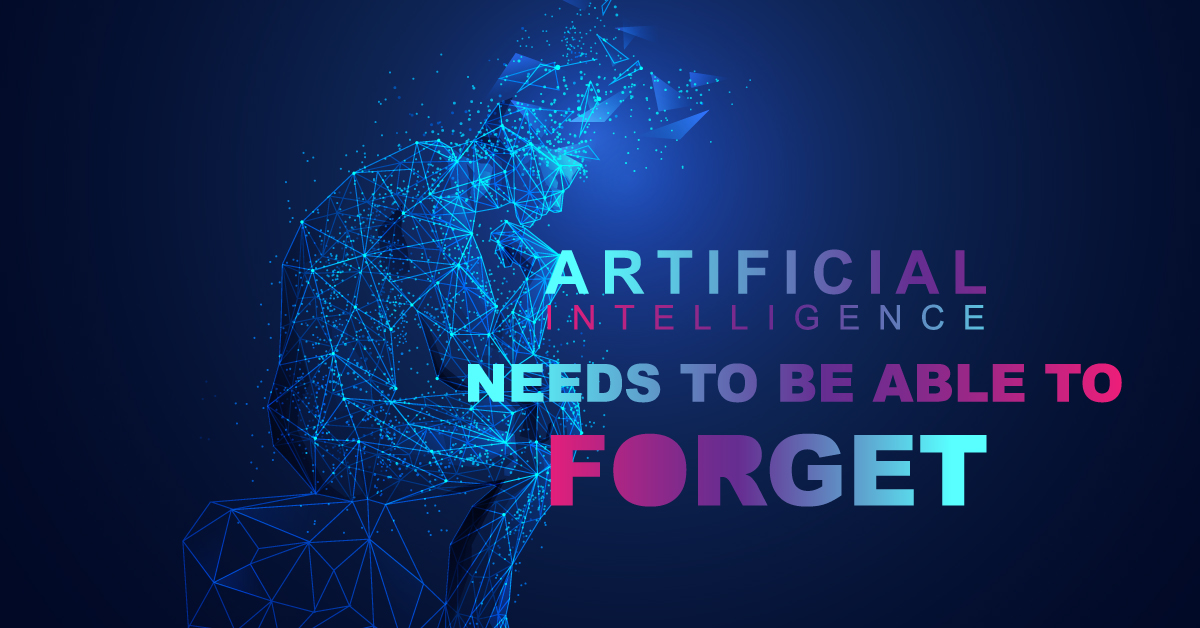When a baby emerges from the womb, the baby’s brain already has all the learning essential for the correct functioning of the body. Isn’t that interesting when our whole premise is learning based on “DATA”?


When a baby emerges from the womb, the baby’s brain already has all the learning essential for the correct functioning of the body. Isn’t that interesting when our whole premise is learning based on “DATA”?

When we discuss AI, almost everyone talks about the ability to learn – Supervised learning, Unsupervised learning, Reinforcement learning, Deep learning, and so on. Although one of the key traits that makes humans intelligent is not learning but the ability to forget.

In next 3 years, AI will rely less on BIG DATA and more on MIN DATA. The new MIN Data approach of AI will enable a whole new set of use cases that seemed unsuited before.

Although there is a preconceived notion that forgetfulness is thought of as a negative consequence of the brain, it actually happens to be a necessary and arguably beneficial function. The brain is the control centre of the body and mind, comprising billions

“The underlying physical laws necessary for the mathematical theory of a large part of physics and the whole of chemistry are thus completely known, and the difficulty is only that the exact application of these laws leads to equations much too complicated

It is not enough to say that something is true just because ‘I know it’s true!’ – we have to have some evidence or argument that gives a justification for our belief. Explanations, justifications, and more broadly epistemology have been the focus

Explainable Artificial Intelligence (XAI) is getting a lot of attention these days, and like most people, you’re drawn to it because the very nature of neural networks – opacity induces the feeling of deprivation that arises from the perception of a gap in

Artificial Intelligence (AI) is democratized in our everyday life. Tractica forecasts the global artificial intelligence software market revenues will grow from around 9.5 billion US dollars in 2018 to an expected 118.6 billion by 2025. Gartner predicts that by 2020, AI technologies will be virtually pervasive in almost
| Cookie | Duration | Description |
|---|---|---|
| cookielawinfo-checkbox-analytics | 11 months | This cookie is set by GDPR Cookie Consent plugin. The cookie is used to store the user consent for the cookies in the category "Analytics". |
| cookielawinfo-checkbox-functional | 11 months | The cookie is set by GDPR cookie consent to record the user consent for the cookies in the category "Functional". |
| cookielawinfo-checkbox-necessary | 11 months | This cookie is set by GDPR Cookie Consent plugin. The cookies is used to store the user consent for the cookies in the category "Necessary". |
| cookielawinfo-checkbox-others | 11 months | This cookie is set by GDPR Cookie Consent plugin. The cookie is used to store the user consent for the cookies in the category "Other. |
| cookielawinfo-checkbox-performance | 11 months | This cookie is set by GDPR Cookie Consent plugin. The cookie is used to store the user consent for the cookies in the category "Performance". |
| viewed_cookie_policy | 11 months | The cookie is set by the GDPR Cookie Consent plugin and is used to store whether or not user has consented to the use of cookies. It does not store any personal data. |